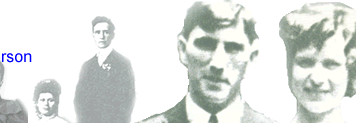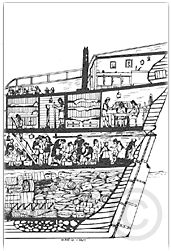Richard came to the New England area with two sons, and is known to be the only line related to the Barttelot family of Stopham, England and they became the original ancestors of that branch of the Bartlett family in America.
He was most likely one of the Wiltshire colonists who came to Newbury, MA, with his family in the company of Rev. Thomas Parker, and his followers. Richard Bartlett married in England, about 1610, and in 1612 purchased the 'Breeches Bible' which shows the births of his children in England.
From the "Breeches Bible":I, Richard Bartlett writ this for the age of my children:
Joane Bartlett borne in Januarey 29, 1610 Wensday 8 of the cloke at nyght
John Bart borne, the 9 of November 1613 at 11 of the clok in the day
Thomas Bart borne Januarey 22, 1615
Richard Bart was borne October the 31, 1621 Wensday borne 3 of the clok
Chris Bart the 25 of Febru 1623 betwen 12 & 1 in the morn"
History Lesson |
The New Testament appeared in 1557. and was probably the product of one man, William Whittingham, an Englishman of great learning, and related to Calvin by marriage. It was a revision of Tyndale's (1525), with an introduction by Calvin. It was the first to use the division of the text into verses. The version of the entire Bible appeared in 1560, the work of English exiled reformers, assisted by Beza, Calvin, and possibly others. The Old Testament was based mainly upon the Great Bible (1539), and the New Testament upon Whittingham's. All were revised from a careful collation of Hebrew and Greek originals, with the use of Latin versions, especially Beza's, and the standard French and German versions. It was dedicated to Queen Elizabeth, who had assumed the throne in 1558, "In bold and simple language, without flattery or reserve". It used the verse divisions and italics, and was the first to omit the Apocrypha. The type was changed from the black letter to the simple Roman type, and the book was small and handy. The explanatory notes were concise and sensible, somewhat Calvinistic in creed and government, but without controversial bitterness.
When the Geneva Bible appeared in England (1560), Queen Elizabeth accepted the dedication, but was cautious. She was interested in the Renaissance more than the Reformation, and wished to be careful to favor "neither Papist nor Gospeller". She desired to be Queen of England, not of any party. Yet the Geneva Version, being so much better than the Great Bible, and backed by the names of the great reformers, Knox, Calvin, Beza, and others, became very popular in England, especially among the common people. The Queen gave silent consent to its distribution and use. It was issued as late as 1644 (33 years after the first King James Version of 1611), and ran through more than 160 editions.
| Stophan Bridge The old bridge over the River Arun at Stopham, England |
|---|
Richard was an Elder in the church and he used the Swan crest which had been introduced in the fifteenth century to commemorate the right of the family to keep swans upon the River Arun, which right had been granted by William the Conqueror.
Massachussetts Bay Colony
Very early in the Massachusetts experiment, dissenters arose to challenge the Puritan vision of a holy society. The first dissenter, Roger Williams (c.1603-1683), was himself a Puritan minister but with a very different vision of God's plan for human society. Williams argued that God had not given divine sanction to the Puritan colony. In his view, the civil authorities of Massachusetts had no authority to involve themselves in matters of faith. The true church, according to Williams, was a voluntary association of God's elect. Any state involvement in the worship or God, therefore, was contrary to the divine will and inevitably led to the defilement of the church.
Bartlett or Barttelot |
Source: "Like many who arrived on these shores in the 17th century, the Puritans of Massachusetts Bay came to America seeking religious freedom. The freedom they sought, however, was for themselves and not for others. The Puritans felt called by God to establish 'new Israel,' a holy commonwealth based on a covenant between God and themselves as the people of God. Though there were separate areas of authority for church and state in Puritan Massachusetts, all laws of the community were to be grounded in God's law and all citizens were expected to uphold the divine covenant.
Banished from Massachusetts in 1635, Roger Williams founded Rhode Island, the first colony with no established church and the first society in America to grant liberty of conscience to everyone."
Estate of Richard Bartlett. Sr. of Newbury Essex Probate Docket
"The testimony of Richard Rawson & Anthony Somersby concerning the last will & testament of Richard Bartlett of Newbury deceased the 20th of May 1647"
About a month before he deceased we being with him and two of his sonnes being prsent he being very ill & had bene weake all the spring finding in himselfe that he was not like to continew he desired us to take notice what his mind was concerning that small estate he had how he would dispose of it. As for his sonne John bartlett he had done for him more than for the rest of the children & at that tyme did not dispose any to him.
To his sonne Christofer Bartlett he did bequeath the debt which latly he had borrowed of him which was five bushells of wheat if soe be it should please the lord to take him away at this sicknesse or ells if he should please the lord to take him away at this sicknesse or ells if he should lye longe vizitted his necessity would require that he should pay it againe.
To his daughter Johan wife of William Titcomb he bequeathed one paire of new shoes for herselfe & her four daughters each one a paire of shoes And all the rest of his goods & chattels that were not disposed of he bequeathed wholly to his sonne Richard Bartlett whom he made his sole heire & executor.
I Anthony Somersby the next day pswaded him to give somthing to his sonne John bartlett his answere was that he had bene with his sonne Richard Bartlet this twelve month & all that he had was to little for to give him seing he had bene weake & ill & could doe little but lay upon his sonnes charges: besides said he if I should lye longe sick I shalbe chargable to Richard & not to any of the rest and for John I have done more formly yet I will give him the warming pan and upon his sonnes request he gaue him a great bible: this he spake being in psect memory & soe continued to the last breath. I Edward Rawson wittnes to the last pt of the will that I often heard the said Richard Bartlett sen (the tyme of his sickness) say he would & did give all to his sonne Richard Bartlett 29th Septemb 1647. this was before the wittncss


